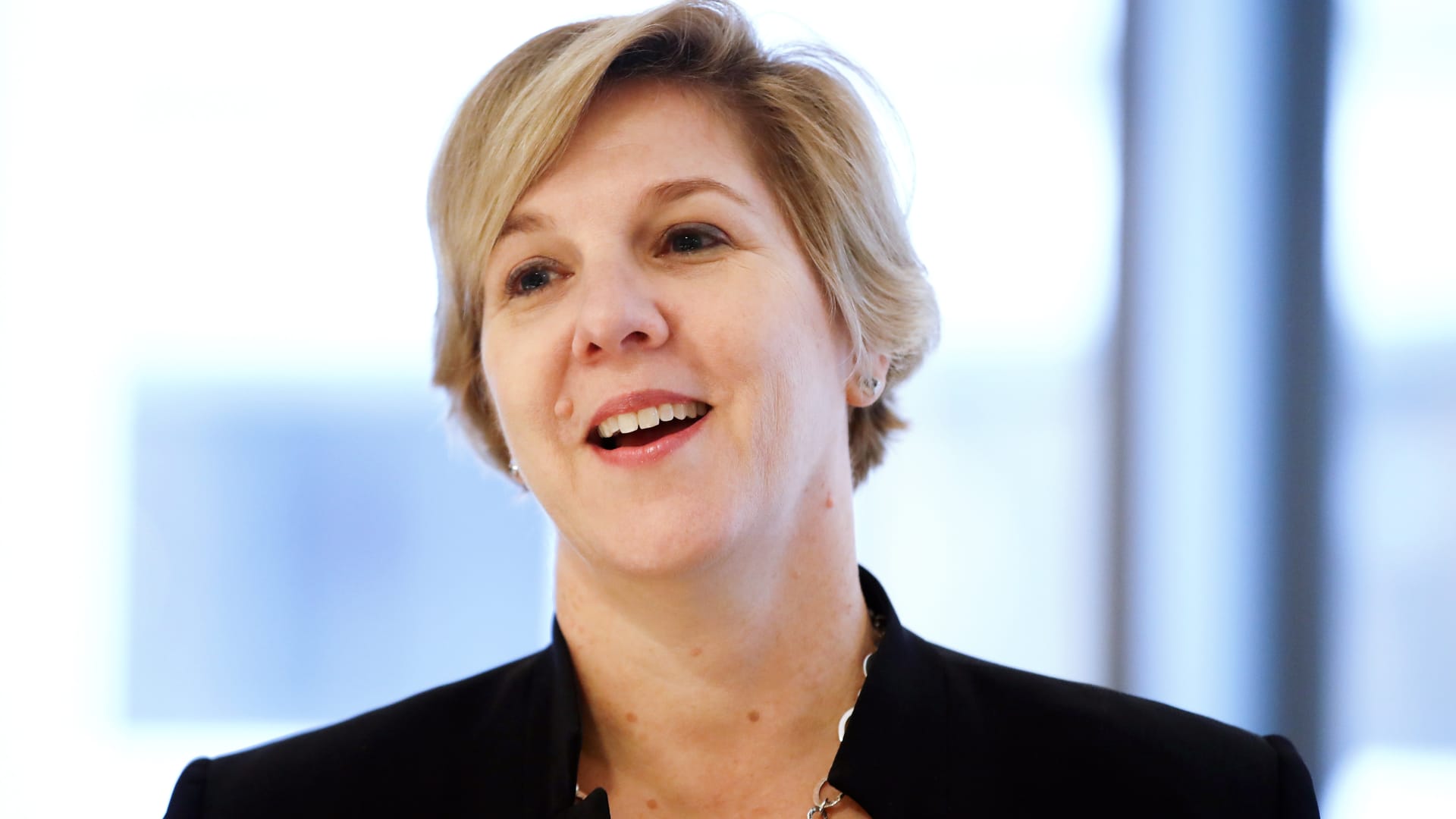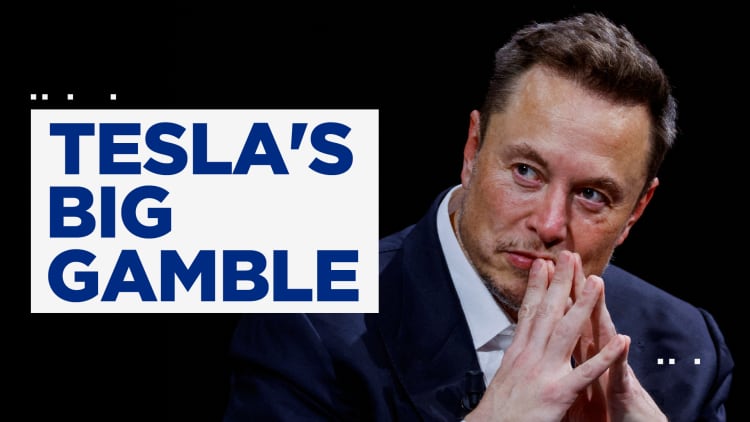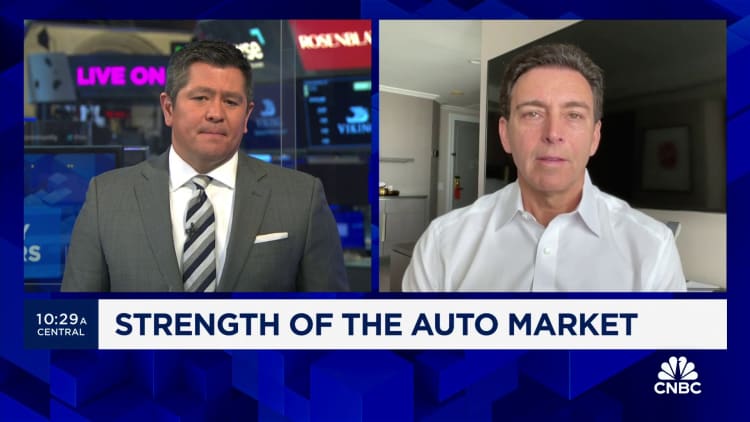Tesla Chairwoman Robyn Denholm has sold over $50 million worth of stock in 2024


Robyn Denholm, chairman of Tesla Inc., speaks during an American Chamber of Commerce in Australia event in Sydney, Australia, on Wednesday, March 27, 2019.
Brendon Thorne | Bloomberg | Getty Images
Tesla Chairwoman Robyn Denholm has just sold $17.3 million worth of her shares in the electric vehicle maker, according to a filing Monday, bringing her total stock sales this year to more than $50 million.
Denholm, who joined Tesla’s board as an independent director in 2014 and became chair four years later, sold the shares as part of what’s called a 10b5-1 program put into place in October. She has now sold all of the 281,116 shares allowed in the agreement.
While Denholm still has the vast majority of the 1.66 million shares she owned as of the end of last year, according to the company’s proxy filing, her stock sales follow hefty selling from other big stakeholders. Former Tesla Senior Vice President Drew Baglino, who announced his resignation in mid-April, sold shares worth around $181.5 million soon after his departure, according to a filing.
Another Tesla board member, Kathleen Wilson-Thompson, set up a 10b5-1 trading plan in February 2024, for the potential sale of up to 280,000 shares by or before Feb. 28, 2025.
Tesla shares are down 26% this year, closing Monday at $184.76. The slide comes as the company faces increased competition, weakened demand for its EVs and a drop in first-quarter deliveries.
CEO Elon Musk has tried to focus investors’ attention on the company’s self-driving future instead of its core automotive business. He told investors on Tesla’s earnings call last month that those who doubt the company’s ability to deliver self-driving vehicles should stay away from the stock. For years, Tesla has been working to develop, but hasn’t brought to market, software that will make its existing cars autonomous, a dedicated robotaxi and humanoid robots capable of factory work.
“If somebody doesn’t believe Tesla’s going to solve autonomy, I think they should not be an investor in the company,” Musk said on the call.
In Denholm’s early years on the Tesla board, she served on the audit committee. She eventually replaced Musk as chair in November 2018, after the company struck an agreement with the SEC to settle civil securities fraud charges requiring Musk to relinquish that role temporarily, among other provisions.
The SEC had charged Musk and Tesla with securities fraud after Musk said, in a series of tweets in 2018 that he was considering taking the company private at $420 per share with “funding secured.” The tweets led to a stretch of volatility in Tesla shares.
Before joining the Tesla board, Denholm served in executive roles at Sun Microsystems, and in finance roles at Toyota in Australia and at accounting firm Arthur Andersen. Denholm is currently part of Tesla’s audit, compensation, nominating and corporate governance, and disclosure controls committees.
Denholm, who didn’t respond to a request for comment, is a named defendant in a shareholder lawsuit — Tornetta vs. Musk — that was decided in January. The judge in the Delaware case ruled that Tesla’s 2018 CEO pay plan, which was the largest in public corporate history, was only allowed by a board that was “beholden to Musk,” and should be rescinded.
In her opinion, Chancellor Kathaleen McCormick wrote that by serving on Tesla’s board, Denholm received “life-changing” compensation, which “far exceeded the compensation she received from other sources.”
Denholm’s latest stock sales coincide with struggles at Tesla and a broad restructuring effort that’s included thousands of layoffs.
Demand for Tesla’s EVs slumped in the first quarter, and inventory levels have visibly swelled. Revenue in the period fell 9% from a year earlier, the steepest drop since 2012, while net income plunged 55%.
Musk said in an internal memo in April that Tesla was cutting more than 10% of its global headcount. He didn’t say which departments or locations would be most affected. In the earnings call, he referred to the restructuring as a “pruning exercise” and added, “We’re not giving up anything that is significant that I’m aware of.” He said that if the company organizationally is “5% wrong per year,” its cumulative inefficiency comes out to 25% or 30%.
Denholm and Musk are currently trying to convince shareholders to vote with directors and executives at Tesla on a number of proxy proposals.
The most material proposal asks shareholders to return to Musk his compensation package that was invalidated by the Delaware Chancery Court in the Tornetta decision. The pay package would be worth tens of billions of dollars in Tesla shares to Musk.
Tesla’s largest individual retail shareholder, tech billionaire Leo Koguan, has repeatedly called for investors to vote against the plan. In a post on X, Koguan recently wrote, “Don’t be a sucker, just vote NO.”
